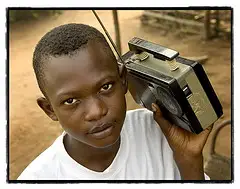Citizen journalism in Africa
 Most countries are far away from reaching the level that Koreans have on citizen journalism, such is the case of the famous Ohmynews: "The Net and Netizens Watchdogging Government." A pioneer of citizen journalism was certainly indymedia.org, which got famous during the WTO protest back in 1999 in Seattle. In German language there is an interesting concept called "Gegenöffentlichkeit" (counter public); it refers to a Bertolt Brecht's text about a two way conversation through a radio from last century 1932.
Most countries are far away from reaching the level that Koreans have on citizen journalism, such is the case of the famous Ohmynews: "The Net and Netizens Watchdogging Government." A pioneer of citizen journalism was certainly indymedia.org, which got famous during the WTO protest back in 1999 in Seattle. In German language there is an interesting concept called "Gegenöffentlichkeit" (counter public); it refers to a Bertolt Brecht's text about a two way conversation through a radio from last century 1932.
It is purely an apparatus for distribution, for mere sharing out. So here is a positive suggestion: change this apparatus over from distribution to communication. The radio would be the finest possible communication apparatus in public life, a vast network of pipes. That is to say, it would be if it knew how to receive as well as to transmit, how to let the listener speak as well as hear, how to bring him into a relationship instead of isolating him.
Mark Glasser says about citizen journalism: "The idea behind citizen journalism is that people without professional journalism training can use the tools of modern technology and the global distribution of the Internet to create, augment or fact-check media on their own or in collaboration with others."
The web enables citizens worldwide to engage in this citizen journalism. In Africa a lot is happening on that already. An interesting article on citizen journalism in Africa by IPS-News, "Citizen Journalism Opening Up Political Space in Africa," describes how the spread of radio and mobile phones have changed the perception of politics and how this can lead to more transparency. Citizens can call in to radio shows and give their opinion in politics. Ghana alone got twenty new radio channels during the last 10 years. So, radio broadcasts more intensive according to the article, but also mobiles are used more and more to raise awareness about human rights violations.
Brenda Burrell said on an interview on mobileactive.org about how a group of human right activists use mobile phones to spread news of latest developments in Zimbabwe. Citzens can report over FrontlineSMS tools on human rights violations. "Our services are so popular because people are really hungry for balanced information, because they do perceive the government media to be propaganda." FrontlineSMS was developed by Kiwanja and was also used to monitor the last election in Nigeria.
Another facet is the growing blogosphere in Africa and its contribution to critical reports about politics or social development. The ISP article sees a strength in these new blogging efforts. However, probably only minority of blogs are dealing with politics and activism. By the way, in Germany the blogosphere is hardly engaging in activism. Imagine beneficiaries from funds would give through their blogs a direct authentic feedback. However, there is also a risk that local content becomes too overwhelming. Professor Lewis Friedland says there is a trend in the US and recalled "hyper-localism", which basically lowers the interest for national or global themes. However, in the case of Germany, I wish there would be a lot more engagement, and for Africa I am thrilled to see the growing blogoshpere on Afrigator.com.